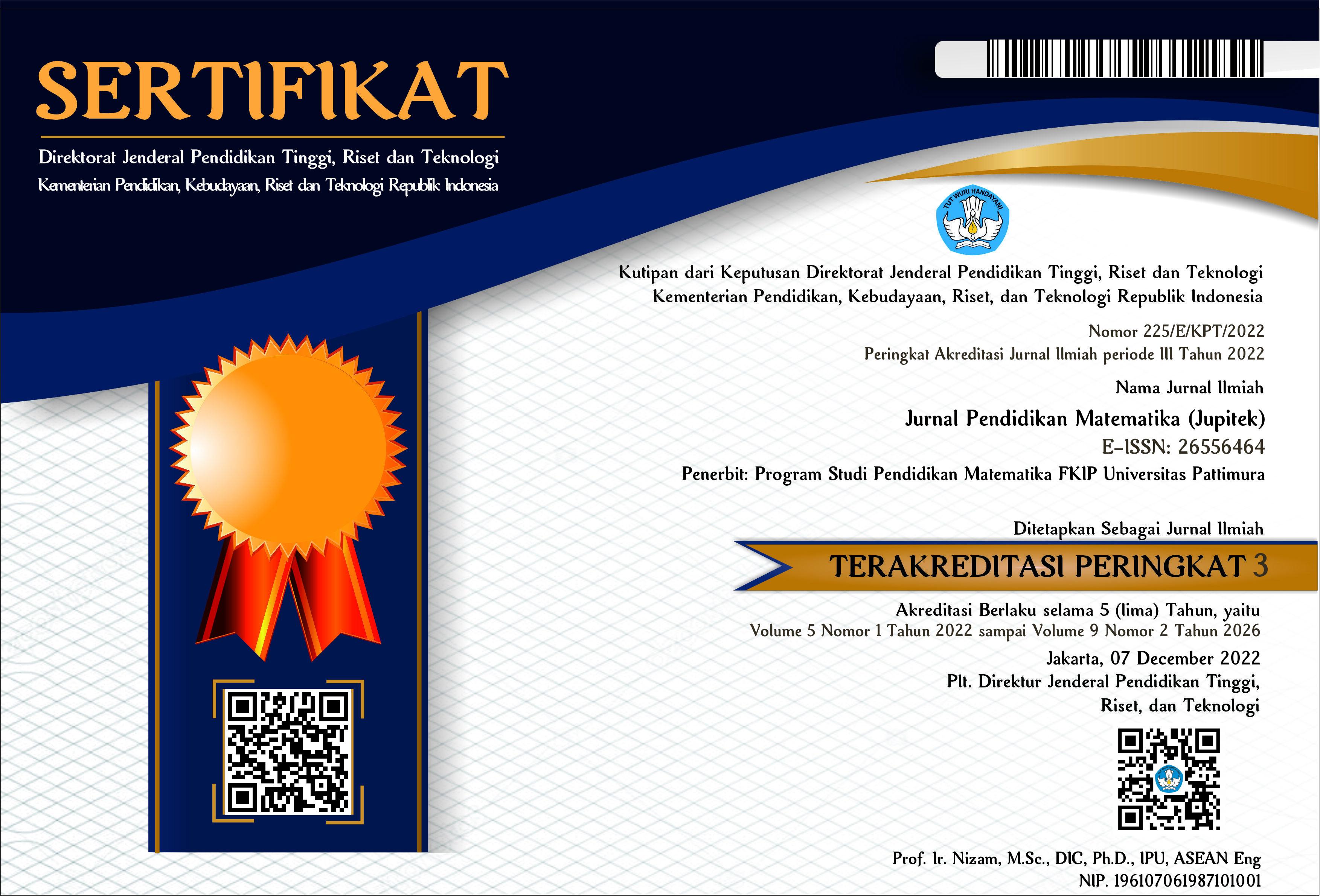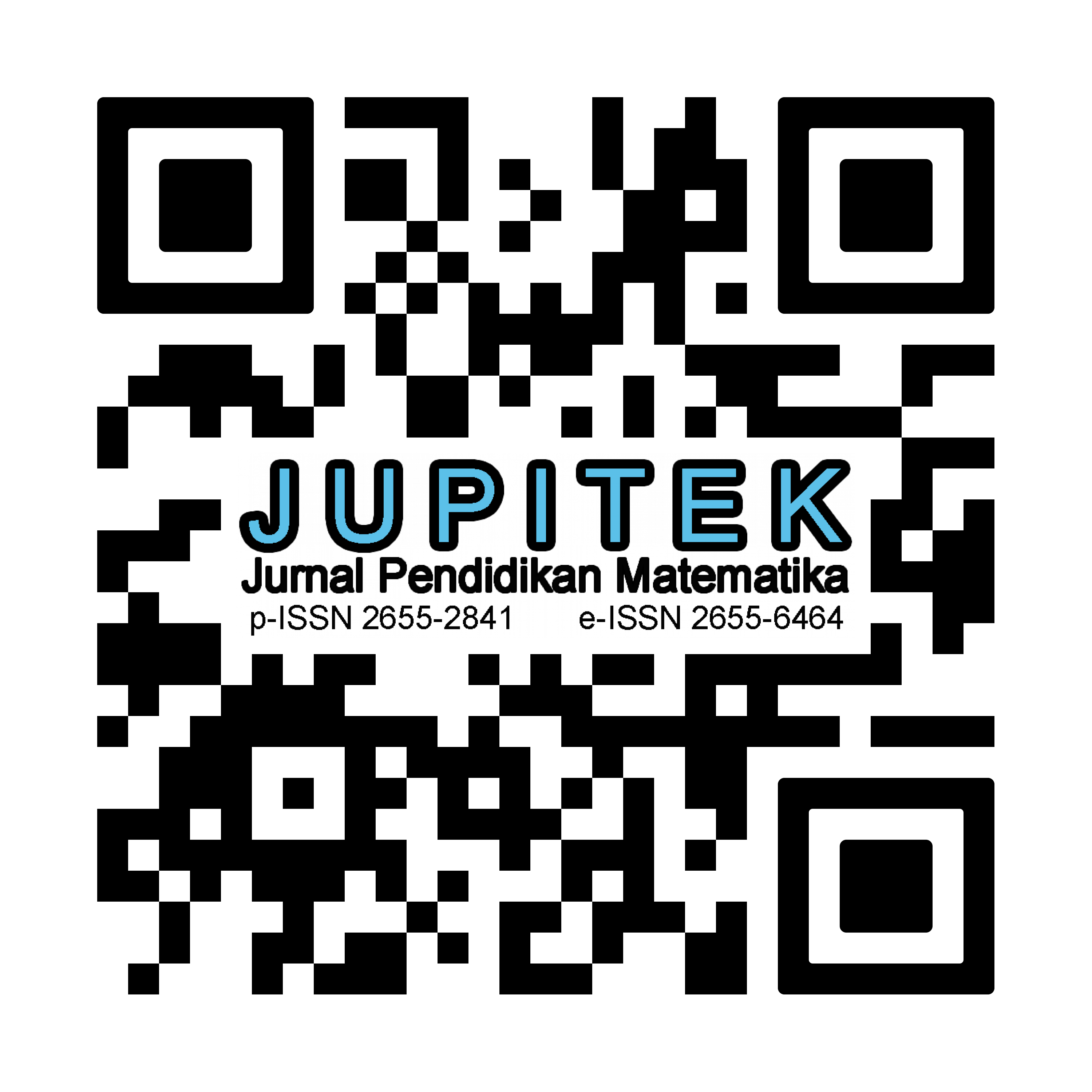PENGEMBANGAN MODEL PEMBELAJARAN PENDIDIKAN MATEMATIKA REALISTIK INDONESIA (PMRI) UNTUK MENINGKATKAN KETERTARIKAN BELAJAR MATEMATIKA
Abstract
This study aims to increase students' interest in learning mathematics. Based on the results of the pre-study, it was found that students were less interested in mathematics learning. This is caused by several factors including (1) mathematics learning so far generally lacks opportunities for students to develop strategic thinking skills, teachers only emphasize students to memorize all formulas or concepts without understanding their meanings, (2) learning is centered to the teacher (the use of lecture methods in mathematics learning) so that students are only used as learning objects, (3) in learning teachers rarely deliver material in real forms but only in abstract form. Therefore the learning series is designed using the Indonesian Realistic Mathematics Education (PMRI) learning approach to answer the phenomena that occur in pre-research. This study is a qualitative descriptive study. Subjects in this study were students of grade VII-A SMP Negeri 1 Pulau Morotai, North Maluku Province which numbered 25 people. The instruments used in this study were tests and interviews of teachers and students. The results showed that after the PMRI learning model was applied students felt interested and could improve mathematical knowledge and could also increase students' activeness in delivering ideas. For example, students dare to interact and negotiate between students and students and between students and teachers during the learning process. In addition, the PMRI learning approach can also reduce the level of abstractness of students in solving mathematical problems. This kind of thing does not happen to the learning by the mathematics teacher before. As a suggestion for teachers, in mathematics learning teachers should be able to connect the real world with mathematics learning because that can facilitate students to solve mathematical problems, and can increase students' interest in learning mathematics
Downloads
References
Daftar Pustaka
Arikunto, S. 2006. Prosedur Penelitian Suatu Pendekatan Praktek . Jakarta: Rineka Cipta.
Departemen Pendidikan Nasional. 2015. Kamus Besar Bahasa Indonesia Pusat Bahasa. Cetakan kesembilan Edisi IV. Jakarta: Gramedia Pustaka Utama.
Eka, Kurnia & Ridwan. 2015. Penelitian Pendidikan Matematika. Bandung: Refika Aditama.
Hamalik, O. 2010. Proses Belajar Mengajar. Jakarta: Bumi Aksara.
Hadi. S. 2005. Pembelajaran Matematika Realistik dan Implementasinya. Banjarmasin: Tulip
Marpaung, Y. 2009. Karakteristik Pendidikan Matematika realistik Indonesia (PMRI). Disampaikan Saat Diklat Enhancing Mathematics Learning in Primary School using Realistic Mathematics Education. Yogyakarta: SEAMEO Regional Center for QITEP in Mathematics.
Nur dkk. 2000. Pengajaran Berpusat kepada Siswa dan Pendekatan Konstruktivis dalam Pengajaran. Surabaya: UNESA.
Polya, George. 1957. How to Solve It. 2nd ed. Princeton University Press. ISBN 0-691-08097-6.
Shaleh, A Rahman dan Muhbid Abdul Wahab. 2004. Psikologi SuatuPengantar Dalam Persepsi Islam: Jakarta.
Slameto. 2003. Belajar Dan Faktor-Faktor Yang Mempengaruhinya. PT.Rineka Cipta : Jakarta.
Soedjadi, R. 2000. Kiat Pendidikan Matematika di Indonesia (Konstalasi Keadaan Masa Kini Menuju Harapan Masa Depan). Jakarta: deraktorat Jendral Pendidikan Tinggi.
Soemanto. 2012. Psikologi Pendidikan (Landasan Kerja Pemimpin Pendidikan). Jakarta: Rineka Cipta.
Suherman dkk. 2003. Strategi Pembelajaran Matematika Kontemporer. Bandung: UPI.
Van den Hauvel-Panhuizen, M. 2003. The Didactical Use Of Model In Realistic Mathematic Education. Educational Studies in Mathematical. 54: 9-35.
Wijaya, Ariyadi. 2012. Pendidikan Matematika Realistik: Suatu Alternatif Pendekatan Pembelajaran Matematika. Yogyakarta: Graha Ilmu
Copyright (c) 2018 Akmal Hi Dahlan

This work is licensed under a Creative Commons Attribution-NonCommercial-ShareAlike 4.0 International License.
License and Copyright Agreement
By submitting a manuscript to Jurnal Pendidikan Matematika (JUPITEK), the author(s) certify and agree to the following terms:
- Originality and Authority: The submitting author is authorized by all co-authors to enter into this agreement. The manuscript describes original work that has not been published previously in a peer-reviewed journal, nor is it under consideration for publication elsewhere.
- Approval: Its publication has been approved by all author(s) and by the responsible authorities of the institutions where the work was carried out.
- Rights: The authors secure the right to reproduce any material that has already been published or copyrighted elsewhere.
- Licensing and Copyright: Authors retain the copyright to their work.
- License Grant: The authors grant Jurnal Pendidikan Matematika (JUPITEK) the right of first publication, with the work simultaneously licensed under the Creative Commons Attribution-NonCommercial-ShareAlike 4.0 International (CC BY-NC-SA 4.0).
- Self-Archiving: Authors are permitted and encouraged to deposit the published version of their article in institutional repositories, on their personal websites, and other academic platforms, with proper acknowledgment of its initial publication in Jurnal Pendidikan Matematika (JUPITEK).






.png)


